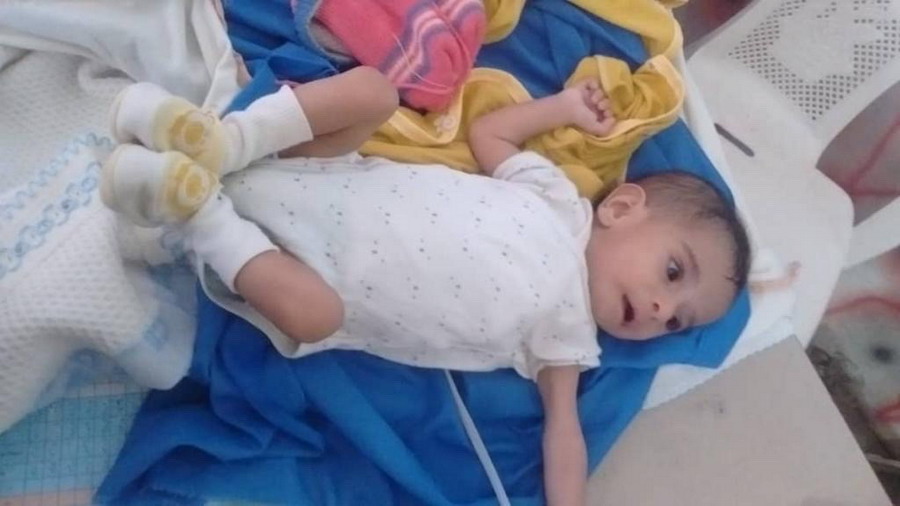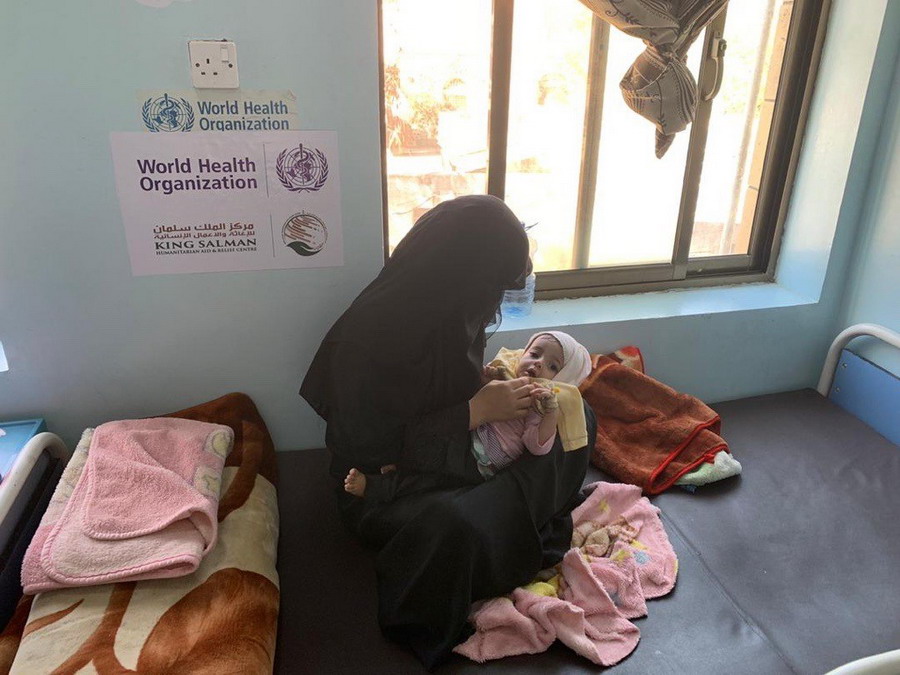 Samer weighed only 3.3 kgs with a 10.9 cm mid upper arm circumference and suffered from medical complications. Thanks to the treatment and nutritional food he had received at Al-Modhafar therapeutic feeding centre supported by WHO and KSrelief, he recovered, and his appetite eventually improved. Photo: Humanitarian Aid and Development Organization
Samer weighed only 3.3 kgs with a 10.9 cm mid upper arm circumference and suffered from medical complications. Thanks to the treatment and nutritional food he had received at Al-Modhafar therapeutic feeding centre supported by WHO and KSrelief, he recovered, and his appetite eventually improved. Photo: Humanitarian Aid and Development Organization
30 March 2021 – In Yemen, child malnutrition is of great concern riven by the conflict and its economic impact, including high rates of diarrhoea, respiratory infections, cholera, and rising food insecurity rates.
Samer Abdulwadood was born 7 months ago in Salh district, Taizz governorate, where his low-income family temporarily settled up to flee the region's ongoing fighting.
Samer's father managed to find a job as a motorcycle transporter, bringing people from one place to another. But he could barely provide a living for the family.
Without the daily nutritional intake necessary to maintain him in good health, Samer ended up suffering from severe acute malnutrition with medical complications.
Half of the children under the age of 5 (2.3 million) in Yemen are projected to suffer from acute malnutrition in 2021, of whom 400 000 are expected to suffer from severe acute malnutrition and could die if they do not receive urgent treatment.
The figures mark an increase in acute malnutrition and severe acute malnutrition, including with medical complications of 16% and 22%, respectively, among children under-5 years from 2020.
Within this context, the World Health Organization (WHO) and the King Salman Humanitarian Aid and Relief Centre (KSrelief) are continuing their joint fight against child malnutrition in Yemen by sustaining essential nutrition services and enhancing access to life-saving interventions for the most vulnerable populations.
Samer's 20-year-old mother is a housewife. She was desperate about her son's severe condition.
"Seeing him so feeble, without being able to help him made me feel useless," she said.
To detect malnutrition cases among children under-5 years of age, WHO has set up a nationwide nutrition surveillance system, a network of sites located in areas with the highest burden of malnutrition, to enable health workers to find, refer and treat these children.
Samer was screened for malnutrition by community health workers deployed by the Humanitarian Aid and Development Organization's (HAD) therapeutic feeding programme in the nearby Al-Modhafar district supported by WHO and KSrelief. He weighed only 3.3 kgs with a middle upper arm circumference of 10.9 cm and suffered from medical complications.
Samer was then transferred to the district's therapeutic feeding centre.
"He was in a critical condition and needed immediate attention to recover," said Dr Mahmoud, Nutrition Officer at the Al-Modhafar therapeutic feeding cemtre.
But recovering from malnutrition can take weeks. To encourage the mothers to stay at the nutrition ward, HAD provides them with food, hygiene kits and transportation allowance. The programme also includes infant and young child feeding sessions to avoid any future relapse or deterioration.
With the support of KSrelief, WHO supports 90 therapeutic feeding centres across 20 governorates in Yemen. This joint effort has helped to cure 7614 severely malnourished children since September 2020.
 Recovering from malnutrition can take weeks. To encourage the mothers to stay at the nutrition ward, HAD provides them with food, hygiene kits and transportation allowance. Photo: HAD
Recovering from malnutrition can take weeks. To encourage the mothers to stay at the nutrition ward, HAD provides them with food, hygiene kits and transportation allowance. Photo: HAD
Thanks to the treatment and nutritional food he had received, Samer recovered, and his appetite eventually improved. The medical team decided to refer him to the nearest supplementary feeding centre to finalize the treatment cycle. Thirty days later, he was referred to the Blanket Supplementary Feeding Programme to ensure he would not suffer again from malnutrition.
"The project raised my awareness of how to take care of my children safely," said Samer's mother, who was sensitized about the importance of taking care of her children's cleanliness and choosing the right diet for them.
"After seeing the positive impact of this programme on Samer, my relatives and neighbours also brought their children for malnutrition screening and treatment," she added.








